Liquids/Linctus
When the tickle in your throat turns into a full-blown cough, over-the-counter (OTC) cough syrups can be your first line of defence. These syrups help tackle various types of coughs, from the dry, irritating kind that keeps you up at night to the wet, productive kind that helps clear mucus from your airways. They come in various formulations, each targeting specific symptoms and providing relief so you can get back to feeling like yourself again. Read More…

-
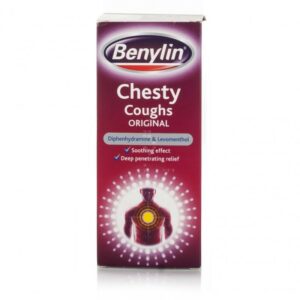
Benylin Chesty Cough Original
- Relieves Symptoms Of Common Cold
- Ingredients: Diphenhydramine, Levomenthol
- Buy With Confidence From UK Registered Pharmacy
£7.69 – £11.49 Select options -
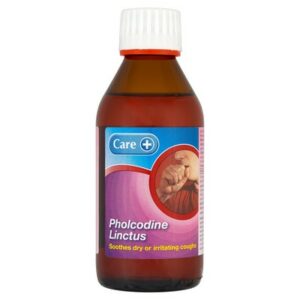
Pholcodine Linctus Cough Syrup 200ml
- Soothes Dry Or Irritating Coughs
- Active Ingredient: Pholcodine
- Blocks The Coughing Reflex
£3.19 – £3.49 Select options -
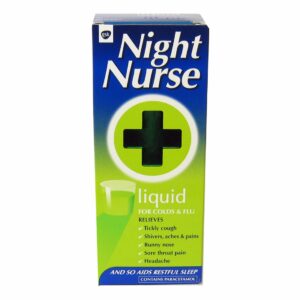
Night Nurse Syrup 160ml
- Relieves Cold And Flu Symptoms
- Active Ingredients: Paracetamol, Promethazine And Dextromethorphan Hydrobromide
- For Night-Time Use
£9.19 Select options -
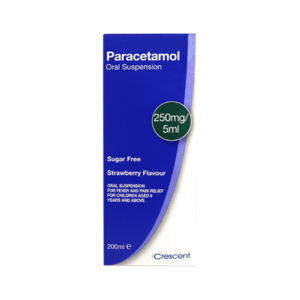
Paracetamol 250mg/5ml Oral Suspension
- Relieves pain and fever in adults and children over 6 years of age
- Active Ingredient: Paracetamol
- Effective in just 15 minutes
£5.19 – £29.99 Select options -
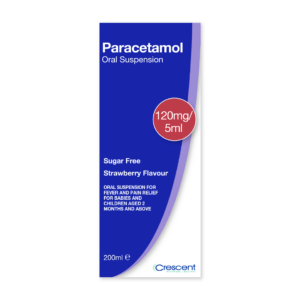
Paracetamol 120mg/5ml Oral Suspension
- Relieves pain and fever in infants and young children
- Active Ingredient: Paracetamol
- Effective in just 15 minutes
£3.49 – £17.99 Select options -
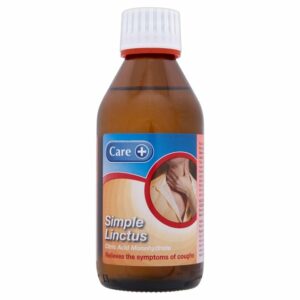
Simple Linctus Cough Syrup 200ml
- Relieves Mild Non-Specific Coughs
- Active Ingredient: Citric Acid Monohydrate
- Soothing Effect
£2.89 Add to basket -
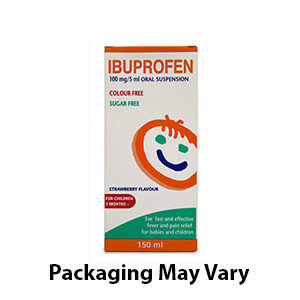
Ibuprofen Oral Suspension For Infants & Children Sugar Free 100ml
- Relieves Pain And Fever In Infants And Young Children
- Active Ingredient: Ibuprofen
- Effective In Just 15 Minutes
£4.79 Select options -
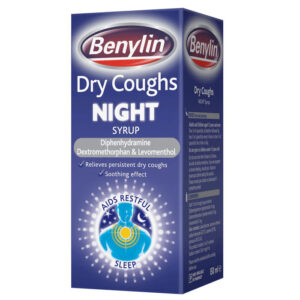
Benylin Dry Coughs Night Syrup
- Effective Relief For Dry Coughs
- Active Ingredients: dextromethorphan / diphenhydramine / levomenthol
- Buy With Confidence From UK Registered Pharmacy
£7.99 Select options -
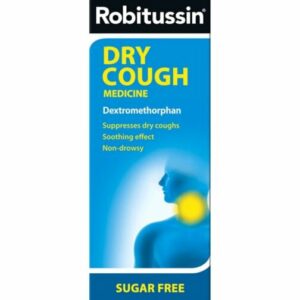
Robitussin Dry Cough – 250ml
- Effective Relief For Dry Coughs
- Active Ingredients:dextromethorphan
- Buy With Confidence From UK Registered Pharmacy
£7.65 Select options -
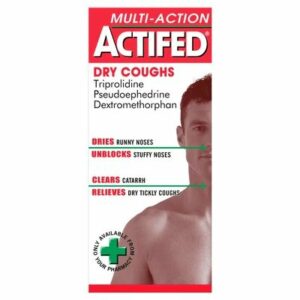
Actifed Dry Coughs Liquid – 100ml
- Active ingredients : Triprolidine, Pseudoephedrine & Dextromethorphan
- Helps Relieve Dry Coughs & Symptoms Related To Congestion
- Next Day Delivery Option Available At Checkout
£6.59 Select options -
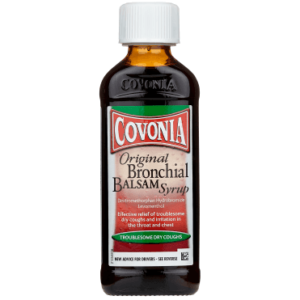
Covonia Original Bronchial Balsam Syrup – 150ml
- Active Ingredients: Dextromethorphan & Menthol
- Relieves a Dry Cough
- Buy With Confidence From UK Registered Pharmacy
£5.29 Add to basket -
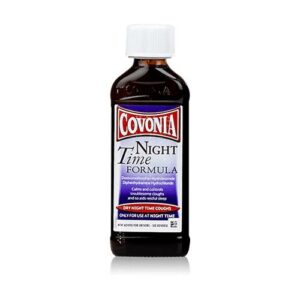
Covonia Night Time Formula – 150ml
- Effective Night Time Cough Relief
- Active Ingredients: Diphenhydramine & Dextromethorphan
- Buy With Confidence From UK Registered Pharmacy
£7.49 Select options -
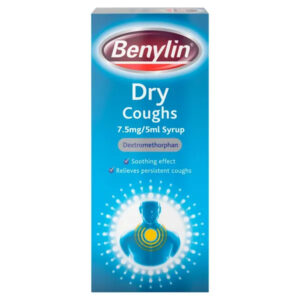
Benylin Dry Coughs 7.5mg/5ml Syrup – 150ml
- Relieves Symptoms Of Common Cold
- Ingredients: Dextromethorphan Hydrobromide
- Buy With Confidence From UK Registered Pharmacy
£7.99 Select options -
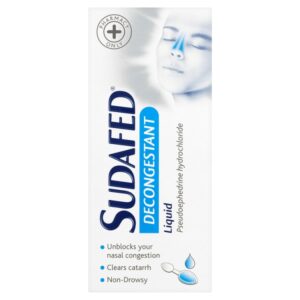
Sudafed Decongestant Liquid 100ml
- Active Ingredient: Pseudoephedrine Hydrochloride
- Provides Relief From Congested Nasal Passages and Sinuses
- Buy With Confidence From UK Registered Pharmacy
£5.79 Select options -
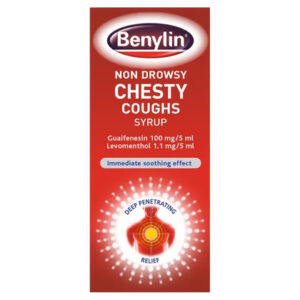
Benylin Chesty Coughs (Non-Drowsy) – 300ml
- Active Ingredients: Guaifenesin & Levomenthol
- Relieves Chesty Coughs
- Buy With Confidence From UK Registered Pharmacy
£7.39 Add to basket -
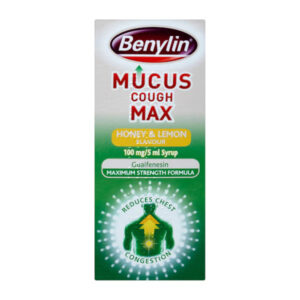
Benylin Mucus Cough Max Honey & Lemon – 300ml
- Active Ingredients: Guaifenesin
- Relieves Mucus Coughs
- Buy With Confidence From UK Registered Pharmacy
£9.99 Add to basket -
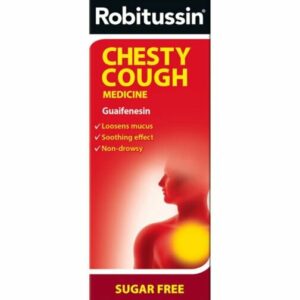
Robitussin Chesty Cough – 250ml
- Effective Relief For Chesty Coughs
- Active Ingredients: guaifenesin
- Buy With Confidence From UK Registered Pharmacy
£7.79 Select options -
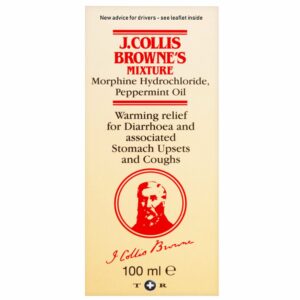
J. Collis Browne’s Mixture 100ml
- Driving licence AND passport ID required to purchase this product
- REFUNDS ARE SUBJECT TO A £5.00 ADMINISTRATION FEE IF ID CAN NOT BE PROVIDED.
- MULTIPLE ORDERS WILL BE SUBJECT TO A £5.00 ADMINISTRATION FEE WITH NO EXCEPTIONS.
£8.79 Select options -
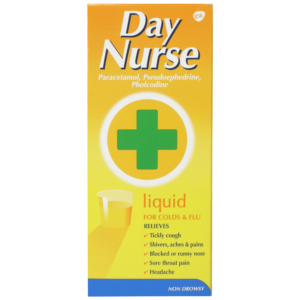
Day Nurse Liquid (240ml)
- Liquid For Colds & Flu
- Active Indredients: Paracetamol Pseudoephedrine & Pholcodine
- Buy With Confidence From UK Resgistered Pharmacy
£10.79 Select options -
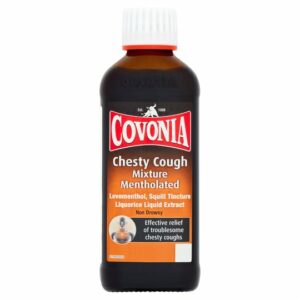
Covonia Chesty Cough Mixture – 150ml
- Active Ingredient: Peppermint Oil
- Suitable For Children Ages 5 And Up
- Effectively Relieves Congestion
£3.99 Add to basket -
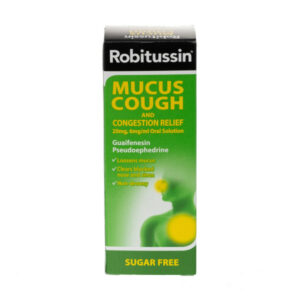
Robitussin Mucus Cough & Congestion Relief – 100ml
- Effective Relief For Mucus and Congestion
- Active Ingredients: guaifenesin and pseudoephedrine
- Buy With Confidence From UK Registered Pharmacy
£5.09 Select options -
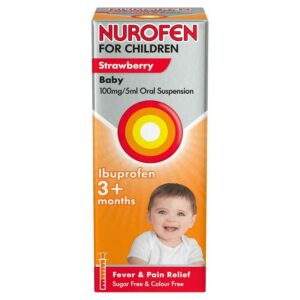
Nurofen For Children Baby 3+ Months – Strawberry Flavour
- Ibuprofen for 3+ months old
- Sugar free and colour free
- Up to 8 hours pain and fever relief
£4.79 Add to basket -
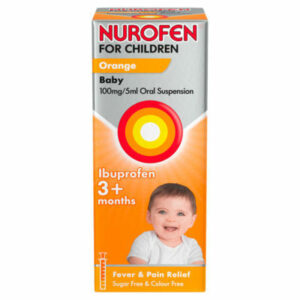
Nurofen For Children Baby 3+ Months – Orange Flavour
- Ibuprofen for 3+ months old
- Sugar free and colour free
- Up to 8 hours pain and fever relief
£4.09 Add to basket -
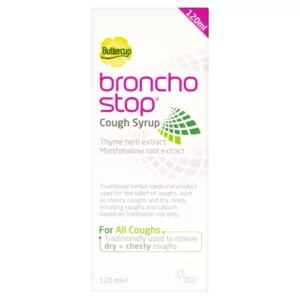
Buttercup Bronchostop Cough Syrup
- Relieves All Coughs
- Buy With Confidence From UK Registered Pharmacy
- Next Day Delivery Available
£8.49 – £11.69 Select options -
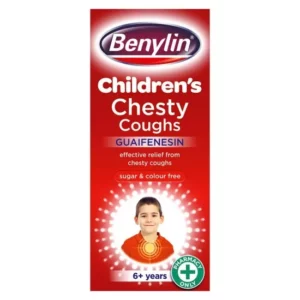
Benylin Childrens Chesty Coughs – 125ml
- Effective Relief From Chesty Coughs
- Active Ingredient: Guaifenesin
- Sugar And Colour Free
£6.19 Select options -
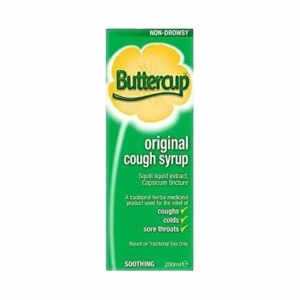
Buttercup Original Cough Syrup
- Effective Cough Relief
- Active Ingredients: Diphenhydramine & Dextromethorphan
- Buy With Confidence From UK Registered Pharmacy
£7.99 – £9.29 Select options -
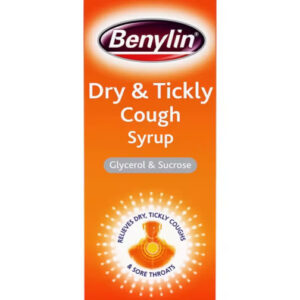
Benylin Dry & Tickly Cough Syrup 300ml
- Active Ingredients: Glycerol & Sucrose
- Relieves Dry & Tickly Cough
- Buy With Confidence From UK Registered Pharmacy
£10.19 Add to basket -

Beechams All In One Liquid 160ml
- Effective Relief For Chesty Coughs
- Active Ingredients: paracetamol / phenylephrine / guaifenesin
- Buy With Confidence From UK Registered Pharmacy
£6.39 Select options -
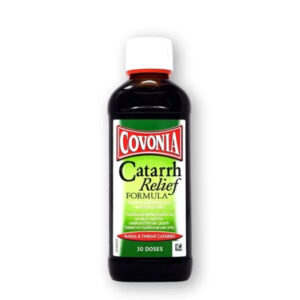
Covonia Catarrh Relief Formula – 100ml
- Active Ingredients: Burdock root / Hyssop
- Suitable for Vegetarians, Vegans & Coeliacs.
- Buy With Confidence From UK Registered Pharmacy
£6.49 Read more -

Covonia Catarrh Relief Formula – 150ml
- Active Ingredients: Burdock root / Hyssop
- Suitable for vegetarians, vegans and coeliacs
- Traditional herbal medicine
£9.50 Add to basket -
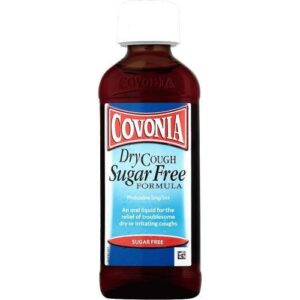
Covonia Dry Cough Formula Sugar Free – 150ml
- Active Ingredient: Pholcodine
- Relieves a Dry Cough
- Buy With Confidence From UK Registered Pharmacy
£6.39 Read more -
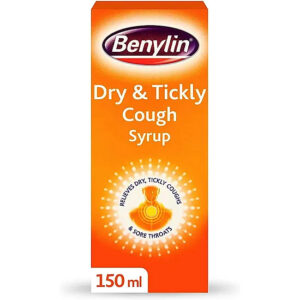
Benylin Dry & Tickly Cough Syrup 150ml
- Active Ingredients: Glycerol & Sucrose
- Relieves dry, tickly coughs & sore throats
- Non-drowsy formulation
£6.29 Add to basket -
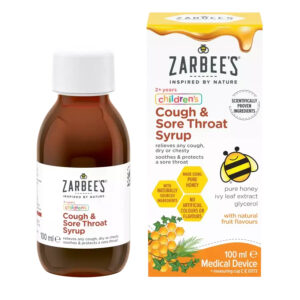
Zarbee’s Children’s Cough & Sore Throat Syrup – 100ml
- Made using pure honey
- No artificial colours or flavours
- Naturally sourced ingredients
£7.99 Add to basket -
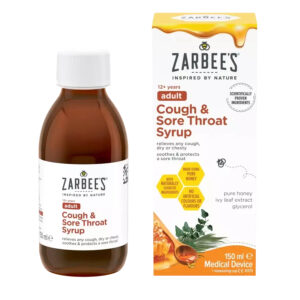
Zarbee’s Adult Cough & Sore Throat Syrup – 150ml
- Made using pure honey
- With naturally sourced ingredients
- No artificial colours or flavours
£9.89 Add to basket
-
About the Condition: Coughs and Colds
Coughs and colds are frequent nuisances, especially during chilly seasons or for those with weakened immune systems. A cough can be dry or produce mucus, while colds often bring on a stuffy or runny nose, sneezing, and a sore throat. Several viruses can spark a cold, with rhinoviruses being the usual culprits. The cold virus can invade your body through your mouth, eyes, or nose and spreads easily through the air or by touching contaminated surfaces. While these conditions are usually mild, they can lead to complications like ear infections, sinusitis, or even pneumonia, particularly in young children or those with chronic health issues.
-
Symptoms
Common symptoms include a sore throat, which can be accompanied by pain, irritation, or a scratchy sensation. Nasal congestion is also common, making it difficult to breathe through the nose. This congestion often leads to a runny nose, with clear or coloured discharge. Coughing is a hallmark symptom, which can be dry or produce mucus. Chest discomfort or a feeling of tightness may accompany the cough. These symptoms are typically mild but can be bothersome and affect daily activities. In more severe cases, symptoms may include difficulty breathing, chest pain, or coughing up blood, which require immediate medical attention
-
Diagnosis
Diagnosing coughs and colds typically involves a healthcare provider examining the patient and discussing their symptoms. In many cases, no specific tests are needed, and the diagnosis is based on the patient’s history and physical examination. However, in some instances, especially if symptoms are severe or prolonged, additional tests such as a throat swab or blood tests may be performed to rule out other possible causes, such as strep throat or influenza.
-
Treatment
Over-the-counter (OTC) cough syrups can be effective in managing and alleviating symptoms associated with coughs and colds. These syrups often contain active ingredients that target different aspects of the condition, providing relief and comfort.
Highlighted products:
Benylin Chesty Cough Original – Relief from Common Cold Symptoms: This syrup contains Diphenhydramine and Levomenthol, which can help relieve chesty coughs and congestion commonly associated with colds.
Pholcodine Linctus Cough Syrup 200ml – Soothes Dry or Irritating Coughs: With Pholcodine as the active ingredient, this syrup is designed to soothe and suppress dry or irritating coughs, providing relief from persistent coughing.
Night Nurse Syrup 160ml – Relieves Cold and Flu Symptoms: This syrup, containing Paracetamol, Promethazine, and Dextromethorphan Hydrobromide, is formulated to relieve symptoms such as fever, aches, pains, and coughing, particularly effective for night time use.
Paracetamol Oral Suspension – Relieves Pain and Fever: Paracetamol is a common ingredient in cough syrups and can effectively reduce pain and fever associated with colds and flu, providing relief for both adults and children over 6 years of age.These over-the-counter cough syrups can help you manage the condition and feel more comfortable during the recovery process. Always follow the recommended dosage instructions and consult with a healthcare professional if symptoms persist or worsen.
-
Prevention Strategies
Preventing coughs and colds often involves practising good hygiene and adopting healthy lifestyle habits. Here are some tips to help prevent these conditions:
Frequent Handwashing: Wash your hands regularly with soap and water, especially after being in public places or touching surfaces that may be contaminated
Avoiding Close Contact: Try to avoid close contact with people who are sick to reduce the risk of catching infections.
Boosting Your Immune System: Eat a balanced diet rich in fruits, vegetables, and whole grains. Consider taking supplements like vitamin C or zinc, which may help support your immune system.
Staying Hydrated: Drink plenty of fluids to keep your body hydrated, which can help prevent the build-up of mucus in your throat and lungs.
Getting Adequate Rest: Ensure you get enough sleep to help your body recover and maintain a strong immune system.
Avoiding Smoking and Exposure to Smoke: Smoking and exposure to second-hand smoke can weaken your immune system and make you more susceptible to infections.
Practising Respiratory Etiquette: Cover your mouth and nose with a tissue or your elbow when you cough or sneeze to prevent the spread of germs.
Keeping Your Environment Clean: Regularly clean and disinfect frequently touched surfaces, such as doorknobs, countertops, and phones, to reduce the spread of germs.By following these preventive measures, you can reduce your risk of developing coughs and colds and maintain better overall health.












